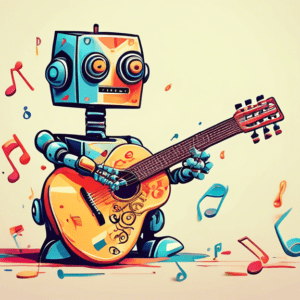Artificial intelligence has infiltrated nearly every facet of modern life, and music is no exception. From AI-powered composition tools to algorithms that predict chart-toppers, the intersection of AI and music is brimming with possibilities. One intriguing application lies in the realm of music parody, a genre demanding wit, musicality, and an uncanny ability to capture the essence of the original work.
The Mechanics of Musical Mimicry: How AI Tackles Parody
AI’s foray into music parody leverages a branch of AI known as machine learning. By feeding massive datasets of lyrics, melodies, and harmonic progressions into algorithms, AI systems can identify patterns and stylistic nuances that define a particular artist or genre. These learned patterns become the building blocks for generating new content that mimics the source material.
Here’s a simplified breakdown of how AI might approach creating a musical parody:
- Data Ingestion: The AI system is trained on a vast library of the target artist’s music, encompassing lyrics, melodies, chord changes, and instrumental arrangements.
- Pattern Recognition: The AI analyzes the data, identifying recurring themes, lyrical motifs, and musical quirks specific to the artist. This could involve detecting rhyme schemes, chord progressions, or even vocal inflections.
- Parodic Transformation: This is where the humor element comes in, though it’s arguably the most challenging aspect for AI. The system must manipulate the learned patterns to create humorous lyrical twists, unexpected chord changes, or stylistic exaggerations while retaining the original song’s essence.
- Content Generation: The AI combines the transformed elements to generate new lyrics, melodies, and even entire musical arrangements that parody the original work.
Early Successes and the Quest for True Satire
The results of AI-generated music parodies have been met with mixed reactions. Some attempts have garnered viral fame, showcasing the technology’s potential for generating catchy hooks and humorous lyrical mashups. However, many efforts fall short of true parody, often producing outputs that feel more like stylistic imitations or nonsensical lyrical jumbles.
The challenge lies in the subjective nature of humor and the complexities of satire. A successful parody requires more than just rearranging words or mimicking melodies; it demands a deep understanding of context, cultural nuances, and the ability to identify and exploit the absurdities within the original work.
The Limits of Algorithms: Where AI Stumbles in the World of Parody
- Subjectivity of Humor: Humor is subjective and culturally influenced. What one person finds hilarious, another might deem offensive or simply unfunny. AI, at least in its current state, struggles to grasp the nuances of humor, often resorting to superficial wordplay or nonsensical juxtapositions that lack comedic impact.
- Contextual Understanding: Parody often relies on referencing current events, social trends, or the specific context surrounding the original work. While AI can be fed information, it lacks the real-world experience and understanding of human culture necessary to weave in these references in a meaningful and humorous way.
- Emotional Depth: The most successful parodies do more than just elicit laughter; they offer a satirical commentary that resonates with the audience on an emotional level. AI’s current inability to truly comprehend or replicate human emotions limits its capacity for creating parodies with true satirical depth.
Collaboration, Not Replacement: The Future of AI in Music Parody
Despite its limitations, AI should not be dismissed as a mere novelty act in the world of music parody. Instead of viewing AI as a replacement for human creativity, it’s more constructive to explore its potential as a collaborative tool.
Imagine AI algorithms acting as creative partners, generating a range of musical and lyrical ideas based on a user’s input. These ideas could then be refined, injected with human wit and cultural context, and crafted into a final product that leverages the strengths of both human and artificial intelligence.
This collaborative approach could usher in a new era of music parody, one where AI assists artists in pushing creative boundaries, exploring uncharted sonic territories, and crafting parodies that are both hilarious and thought-provoking.
The Final Note: A Harmonious Blend of Human Ingenuity and Artificial Intelligence
As AI technology continues to evolve, it will be fascinating to witness how it further shapes the landscape of music parody. While AI may never fully replicate the nuanced humor and social commentary that defines the genre’s best works, its ability to analyze musical patterns and generate creative fodder holds immense potential for artists seeking new avenues of expression.
Ultimately, the future of music parody likely lies in a harmonious blend of human ingenuity and artificial intelligence, where each complements the other’s strengths to create works that are both entertaining and thought-provoking.
